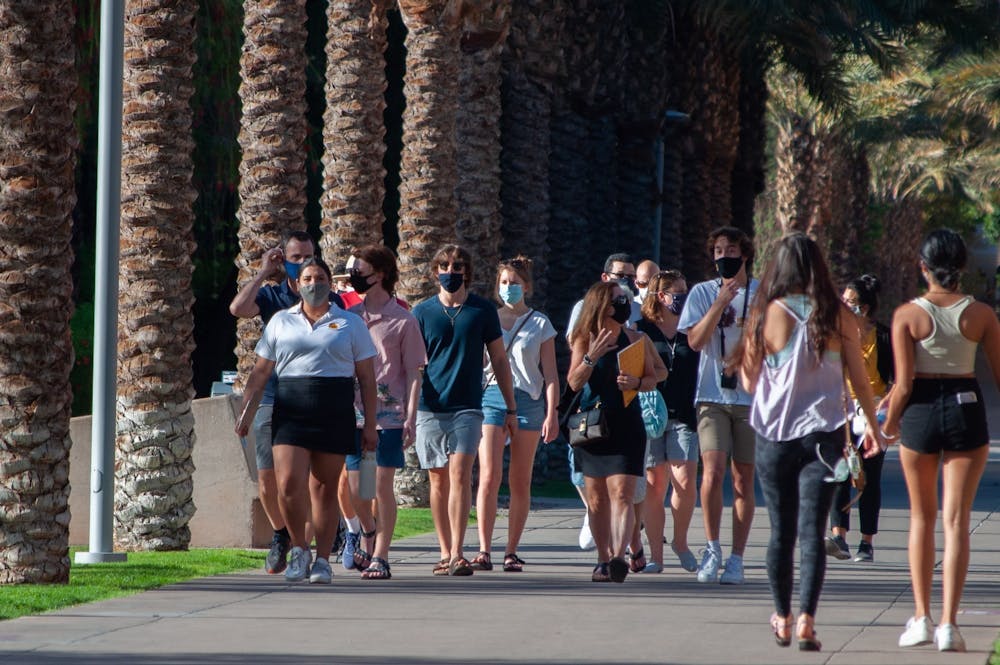With monkeypox cases continuing to spread across the country, some students would like to see ASU give more attention to the virus and provide more guidance to the University community on how it spreads and how it can be treated.
Most information available to students was sent in an email and through ASU Health Services on Aug. 11 titled “Important Health Message," following the declaration of monkeypox as a public health emergency by the White House.
The University’s message referred students to read recommendations from the Maricopa County Department of Public Health, where vaccines are available, and to the Centers for Disease Control and Prevention.
“The extent to my knowledge of the monkeypox virus is an email I received at my ASU address," said Jean Sullivan, a freshman studying music therapy. "But I don’t know very much about it.”
Reported cases of monkeypox in Maricopa County have reached 300, as of Sept. 6, according to the Maricopa County Department of Public Health.
“I think it is important to remember that monkeypox is a rare disease, and the risk to the general population on campus remains low," epidemiologist and associate professor at the School of Human Evolution and Social Change Megan Jehn said. "We should be concerned, but not panicked."
Jehn said the reduced number of cases "is likely the result of behavior changes, community outreach and vaccination."
Jehn said ASU is working with public health and clinical partners to give access to testing, vaccines and treatment. ASU is also tracking cases in the surrounding community while monitoring epidemiological data.
“In Maricopa County, the initial cases have primarily been in gay, bisexual, and other men who have sex with men,” Jehn said.
Jehn remains concerned about the monkeypox virus, and it can be contracted by anyone regardless of sexual orientation. She said the virus is difficult to eliminate, and for some, is very serious and painful.
Jehn said Monkeypox is a virus that needs thought-out communication strategies because of the stigma surrounding it in the marginalized communities where initial cases were reported.
She said one approach by the University has been having conversations with student organizations, clubs and student leaders within the impacted community to provide fact-based information about monkeypox and tools they can use to protect themselves and others.
Alexis Koskan, an assistant professor of population health at the College of Health Solutions, recommends students talk with a health care provider to assess their risk if they perceive themselves as being high risk.
Some public health professors said they would like ASU to send out more messages to students and staff on monkeypox.
Students who spoke to The State Press expressed concern over the lack of information they have about the virus. "I don’t know much about the monkeypox virus," Sullivan said. "I don’t know how it spreads."
Little about monkeypox can be found on the ASU Health Services website to help clarify these questions.
Elisia Jimenez, a junior studying biological sciences and philosophy said she does not remember receiving a message about the virus.
"It’s almost like it’s not even a thing, and I rarely hear about it unless I’m looking online at the news," Jimenez said.
ASU Media Relations declined to answer questions from The State Press but provided a link to a Monkeypox FAQ University page for employees.
This page defines the spreading of the virus as “skin-to-skin contact … it can also be transmitted through sexual contact or bodily fluids and by sharing or touching objects an infected individual has used.”
What information ASU should be sharing with its community is hard to determine, Koskan said, but it is clear a limited amount has been disseminated so far.
Jimenez said the University should use social media to publicize things regarding public health around monkeypox.
"Anything in that regard, through those mediums, it would reach a lot more people and would be more easily accessed and you wouldn’t have to sift through your whole email and read through a whole newsletter," Jimenez said.
Edited by Jasmine Kabiri, Wyatt Myskow and Luke Chatham.
Reach the reporter at abickle@asu.edu and follow @AlyssaBickle1 on Twitter.
Like The State Press on Facebook and follow @statepress on Twitter.

Alyssa Bickle is a staff reporter, writing for the community and culture desk. She is a writing tutor for University Academic Success Programs, and a fellow in the Center for the Study of Religion and Conflict. She is pursuing bachelors degrees in journalism and political science.




